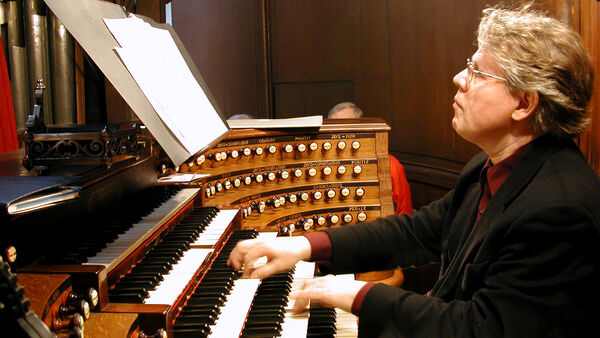Powerful Music in Paris’ St. Sulpice
By Rick StevesWhen I attend church services in Europe, surrounded by vast drafty buildings, statues of weary saints, foreign-language sermons, and tiny congregations, it's the music that sends me.
And in Paris' St. Sulpice Church, that music comes with a bonus: a pipe-organ concert. And not just any pipe organ concert. I'm sitting on the bench with perhaps the greatest organist in Europe as he plays what many consider the finest pipe organ anywhere.
The spiritual sails of St. Sulpice have been filled for two centuries by its 6,600-pipe organ. Enthusiasts from around the world come to Paris just to hear it played.
As the 10:45 Sunday Mass finishes, most of the crowd files quietly out. But a few always remain seated as the organist runs a musical victory lap. I remember my first visit well. I sat next to Arnaud, a young organist from Switzerland who never comes to Paris without visiting St. Sulpice. When the organ stopped, he whispered, "Follow me. You see nothing like this in America."
I followed Arnaud to the back of the church where the group of organ fans gathered. A small churchmouse-of-a-man opened a tiny, unmarked door. We scampered like sixteenth notes up a spiral staircase into the organ loft of our wildest fantasy. The organ enthusiasts became animated. Intimate with an obscure world, they spoke of masters from 200 years ago as if they just heard them in concert.
Arnaud stopped me at a yellowed document. Dragging his finger reverently down the glass frame, he said, "The 12 St. Sulpice organists. Most are famous in the evolution of pipe-organ music. With no break, they make wonderful music here in this church for two centuries." The lineage is charted — like presidents or kings — on the wall. Charles-Marie Widor played from 1870 to 1933. Marcel Dupré from 1934 to 1971. And now, Daniel Roth.
"Dupré started a tradition at St. Sulpice," Arnaud said. "Now people who love the organ are welcome here in the loft every Sunday."
The dozen or so visitors gathered around Daniel Roth. He knew he was sitting on a bench that organists the world over dream of warming. Maintaining Dupré's tradition of loft hospitality, Roth was friendly in four languages.
History was thumb-tacked all around: dusty charts of the pipes, papers from master organ builders, busts of previous organists, and a photo of Albert Schweitzer with Dupré. And overseeing everything was a bust of the god of organists, Johann Sebastian Bach.
Arnaud pulled me behind the organ into a dark room filled with what looks like 18th-century Stairmasters. "Before electricity, it took five men to work these bellows. And these powered the organ."
Suddenly, the music for the second Mass began. Back at the organ, a commotion of music lovers crowded around a tower of keyboards in a forest of pipes.
In the middle of it all, under a dangling heat lamp, sat Daniel Roth. A slight, unassuming man who actually looks like an organist, he pushed back his flowing hair with graceful fingers. Then, with a boyish enthusiasm, he sank his fingers into the organ.
With an assistant on either side of the long bench, and arms and legs outstretched like an angry cat, Roth played all five keyboards. Supremely confident, he ignored the off-beat camera flashes of his adoring fans, followed the progress of the Mass via a tiny mirror, and made glorious music.
The keyboards were stacked tall, surrounded by 110 stops — wooden knobs that turn the pipes off and on — creating a multitude of tonal packages. Between hurried huddles, his assistants pushed and pulled the stops after each musical phrase.
Arnaud propped a chair against the front wall of the organ, allowing me a commanding perch to oversee the musical action. On a well-worn wooden keyboard of foot pedals spreading below the bench, Monsieur Roth's feet marched with his fingers as he craned his neck to find the priest in his mirror.
Turning around, I peeked through the pipes and down on a tiny congregation. Just as priests celebrate Mass in a church whether there are worshippers present or not, this organ must make music. I marveled at how the high culture of Europe persists. I'm thankful to have experienced it, in person, with Daniel Roth. (While the loft is no longer open to visitors, you can always hear the organ played at Sunday Mass, followed by a high-powered 25-minute recital, usually still performed by Roth himself).


